A driverless car picks you up from your home and drops you outside the terminal of the airport you're flying from. Inside, you head for the check-in counter, where a machine scans your face, iris and fingerprints. A biometric token is delivered to your smartphone. It will serve as your ticket, boarding pass and ID. You head for security where you pass through laser molecular body scanners, capable of detecting even the tiniest quantity of dangerous materials in your clothes or luggage, without the need for any kind of body search.
Security cleared, a virtual assistant appears, to usher you in the direction of your gate. If you want, you can purchase duty-free from virtual shopping stations, specifying which day you would like the goods delivered to your home when you return from your trip – no need to input your address, just swipe your digital ID.
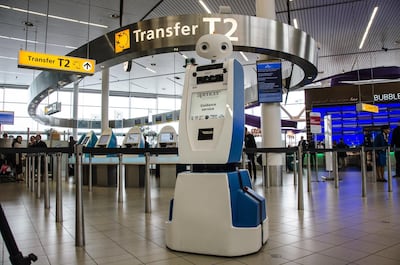
A scanner reads your biometric token then X-rays your face, allowing you to board the aircraft where you sit in your seat and access an in-flight entertainment system containing all your favourite movies and TV shows. The playlist has back catalogues from your most-listened to bands and, in case you want to try something new, there’s a media library curated according to your personal preferences. A reminder pops up on screen that you’re 30 minutes into a movie that you started watching in your living room a few nights ago, asking if you’d like to pick up where you left off.
In front of your seat, where you used to find magazines, is a personalised amenity bag – filled with miniature products matched to your skin type. A pair of complimentary pyjamas in your size are delivered to you and you get a notification telling you at exactly what time meals will be served. It also confirms that vegetarian pizza, your favourite food, is on the menu once again.
This is the future of flying, and it might not actually be that far away.
Playing catch up
That’s because the technology used in the world of travel is finally beginning to catch up with other industries. And as this technology improves, things are changing rapidly. For Ben Vinod, senior vice president and chief scientist at Sabre Corporation – a technology provider to the global travel industry – it’s an exciting time.
"I've been in the travel tech industry for a while and I've seen a lot of change, but now I'm seeing a lot of emerging technologies, mostly in the Artificial Intelligence space. Traditionally, the travel industry has not been on the leading edge of adopting AI technology and that means there is a lot of opportunity in terms of what can change."
And while some recently revealed futuristic innovations in air travel depict bigger departures from the current set-up – think floating airports and terminal buildings where the gates go to the planes, rather than the other way around – personalised, frictionless journeys are actually just around the corner.
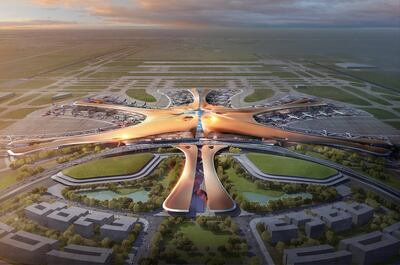
Just look to China, where construction has already been completed on the Beijing Daxing International Airport. Opening in September this year, the world’s most expensive airport (designed by the late British Iraqi architect Zaha Hadid) has been dubbed the ‘starfish’ thanks to its futuristic five-armed shape. Test flights are already in process at this seven-runway behemoth. Inside the 700,000 square metre concourse, thousands of passengers will travel daily on entirely paperless journeys thanks to smart technologies. From facial recognition scanners for self-check in to radio-frequency identification for baggage drop and tracking, the journey through this airport is designed to be seamless, personalised, automated and powered by the latest technology.
Instant gratification
For Terry Kane, head of travel for Facebook across the Middle East, North Africa and Pakistan, removing friction from travellers’ journeys is the critical next step in the future of travel. “When we look at what people are doing anywhere online, it’s very much about wanting things now, now, now. People want instant gratification and the tech in travel is not yet following suit. That’s something we want to change,” says Kane.

Having recently launched a travel hub website designed to help travel companies accurately connect with customers, Facebook is trying to smooth the connection between traveller and travel operator. “Let’s say that you want to fly to the Maldives, for instance,” Kane explains. “You’ll have a personal choice and expectation on where exactly you want to go, how you want to get there and what you want to do there. Facebook data helps companies target you with that information most effectively. It’s about understanding your preferences, your wishes and your needs, then helping brands to talk to you more personally – but without revealing any of your personal information.”
A question of privacy?
Of course, customised services come with a privacy cost – an element of Facebook that has previously led to the company issuing a public apology and chief executive Mark Zuckerberg testifying in front of the US Senate. For Kane, it's all about getting the balance right. "In reality, it's always going to be a fine balance when it comes to privacy and data, with people wanting to use and get the most relevant information, and also giving some personal information away to allow companies that are important to them to target them more accurately."
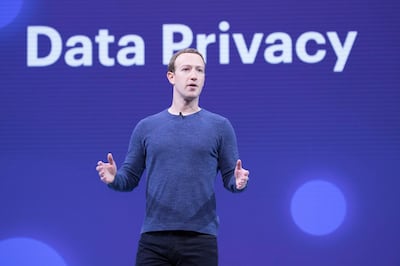
WhatsApp will be another key tool in the future of travel, says the Facebook executive. "We'll be able to reserve flights, get boarding passes, book accommodation, all on WhatsApp and Facebook Messenger," he explains. Passengers flying on KLM and Singapore Airlines can already enjoy the basics of this technology, being able to upgrade, change seats and get information on lost luggage through WhatsApp. But in the future, travellers will be able to use it for a lot more. "This already exists to some degree. It's very new and in the very early stages, but it's coming," confirms Kane.
Facebook also sees itself playing a more intimate role in the future of travel. “Mark [Zuckerberg] talked the other week about two scenarios that he sees playing out in the future,” details Kane. “One is that we have the town hall scenario, where you do all of your trading and commerce and conversations publicly. Then you have the living room scenario where you just want to have small groups, direct messaging and more personal relationships, and that is very relevant for travel.
"Many people already use this, even me – I'm planning to take a long trip in Latin America this summer with my daughter who is six years old. I want her to be able to have friends on the trip of a similar age, but I cannot find that in the masses. That's when you have to go specifically into things like Facebook groups."
The potential for these groups and other Facebook-driven tools to play a part in how travel and technology evolve together is huge. Kane says: "In the future, it'll all be very different to where we are today. In 10 years' time when my six-year-old is travelling by herself, she'll be looking at things like the phone I use now and asking what on earth it is."
Personalised planes
AI is certainly another tool shaking things up. Facebook is using it to help companies offer travel experiences that are personal to each holidaymaker and has the capacity to take this even further. "From the moment you sit down in an airline seat – it should know you as yourself and your experiences, it should know what programmes you want to watch and be able to let you pick up where you left off last time. The technology suite is already there," nods Kane.
And that's not even considering Virtual Reality (VR) or Augmented Reality (AR), two elements that Kane deems thrilling: "If we look at the technology today in terms of VR, it is still not where it needs to be, but that's where it will inevitably end up. It's super exciting."
That’s a comment Vinod agrees with. As one of the world’s largest travel technology providers, Sabre is already implementing changes. “Right now, there’s still a fragmentation of content, but technology is definitely helping us to solve this. We have a large amount of data from hotels, airlines, etc, but we’re working on getting other content that we should have – like information on low-cost carriers. We need this so that travellers can see all the information in one place, and book travel easily and efficiently.
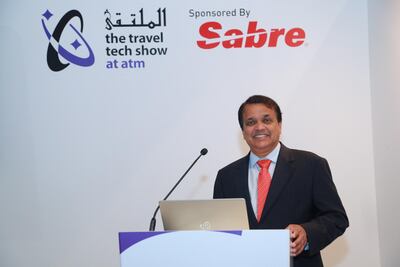
We're also working on live shopping tools that will allow us to answer travellers' questions, like: 'What is the lowest price to X destination for the next 11 months?' or 'I want to go to a beach destination and I have $1,000 (Dh3,672) to spend, where can I go?'."
Ultimately, Sabre intends to get its technology to the stage where travellers search for a trip and, rather than getting multiple options, are provided with one perfect journey. “Instead of returning hundreds of itineraries back, I return a single itinerary, confident that it’s the best one. This is how you simplify travel,” says the Sabre scientist.
Travellers always have their face with them
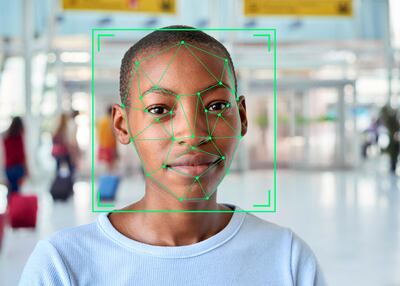
Vinod is also backing facial recognition technology. "It won't be long before travel documents, and even things like corporate IDs disappear and facial recognition takes over." He talks about a recent visit with his team to Microsoft's headquarters. "They told us to stand in a section of the hall and had a camera pointing at us. Before long, our faces appeared on the wall and there was a circle around each of us. In less than a minute, it told us each how old we were – using Microsoft technology. They got everyone exactly right, except for one. But after a few moments, the technology corrected itself so that it got every age exactly spot on."
If you're an Apple user, this shouldn't be too much of a surprise. Facial recognition is what Apple already uses to unlock some of its devices. For Vinod, we're coming close to sci-fi levels. "Remember the movie Minority Report?" he asks. I nod. "It came out over 15 years ago, and in it Tom Cruise was walking down the street or corridor and facial recognition meant everyone knew exactly who he was – we're almost there."
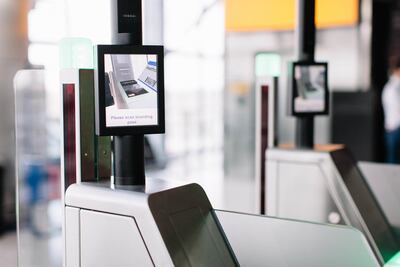
And he's not wrong. In the US, Delta Air Lines has already begun trials of using biometric data as a way to speed passengers through airports. Similarly, Jet Blue is testing facial recognition equipment at Boston Logan International Airport to match travellers with their passport photos, and New York's JFK has been using facial recognition tech for boarding. London Heathrow, Britain's biggest airport, has installed permanent facial recognition technology that's already in use on selected flights, with over three million British Airways passengers having already used the technology to get a glimpse of what flying will be like in the future. It seems that tomorrow's travel experience is closer than we think.


